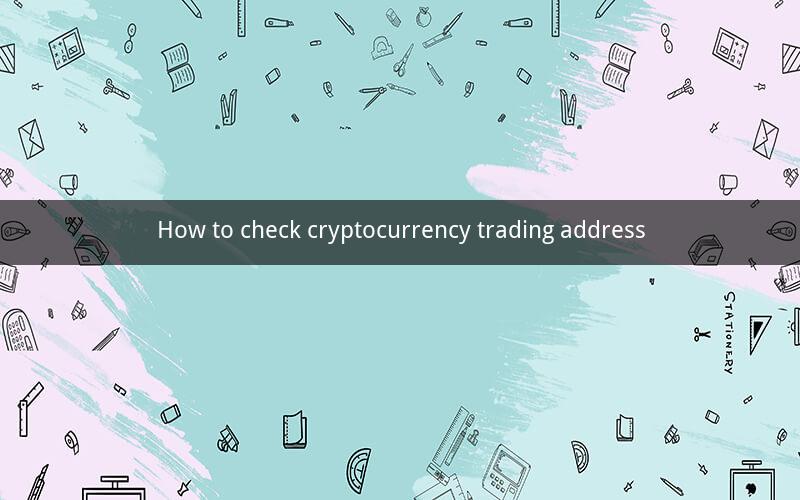
Table of Contents
1. Introduction to Cryptocurrency Trading Addresses
2. Importance of Verifying Cryptocurrency Trading Addresses
3. Steps to Check Cryptocurrency Trading Address Validity
3.1. Use Blockchain Explorer
3.2. Verify Address Format
3.3. Check for Address Reputation
3.4. Use Trusted Third-Party Tools
4. Common Issues and How to Avoid Them
4.1. Phishing Scams
4.2. Invalid Addresses
4.3. Double-Spending Attacks
5. Conclusion
---
1. Introduction to Cryptocurrency Trading Addresses
Cryptocurrency trading addresses are unique identifiers that allow users to send, receive, and store digital currencies like Bitcoin, Ethereum, and Litecoin. These addresses are typically a string of alphanumeric characters, and their validation is crucial for secure transactions. In this article, we will explore how to check the validity of a cryptocurrency trading address and discuss common issues that may arise during the process.
2. Importance of Verifying Cryptocurrency Trading Addresses
Verifying cryptocurrency trading addresses is essential for several reasons:
- Security: Ensuring the address is valid helps prevent scams and fraudulent activities.
- Transparency: It allows users to confirm that the address belongs to the intended recipient.
- Prevention of Mistakes: Verifying the address format reduces the risk of sending funds to the wrong address.
- Trust: It builds trust between parties involved in a transaction.
3. Steps to Check Cryptocurrency Trading Address Validity
To check the validity of a cryptocurrency trading address, follow these steps:
3.1. Use Blockchain Explorer
Blockchain explorers are online tools that allow users to view transaction details and blockchain data. Here's how to use them:
1. Open a blockchain explorer for the specific cryptocurrency (e.g., Bitcoin Block Explorer for Bitcoin).
2. Enter the trading address in the search bar.
3. Review the information displayed, such as the total balance, transaction history, and address status.
3.2. Verify Address Format
Cryptocurrency addresses have a specific format and length. For example, Bitcoin addresses are 26-35 characters long and start with '1' or '3'. Ethereum addresses are 42 characters long and start with '0x' followed by 40 hexadecimal characters. Make sure the address adheres to the correct format for the cryptocurrency in question.
3.3. Check for Address Reputation
Research the reputation of the address. Look for any reports of scams, phishing attempts, or suspicious activities. Online forums, social media platforms, and cryptocurrency communities can provide valuable information.
3.4. Use Trusted Third-Party Tools
Several third-party tools can help verify cryptocurrency trading addresses. These tools often provide additional features, such as address balance checks, transaction history, and risk assessments.
---
4. Common Issues and How to Avoid Them
4.1. Phishing Scams
Phishing scams involve sending fraudulent emails or messages that appear to be from legitimate sources. To avoid falling victim to these scams:
- Always verify the sender's email address or message source.
- Do not click on suspicious links or download attachments.
- Use two-factor authentication for your cryptocurrency wallets and exchanges.
4.2. Invalid Addresses
Invalid addresses can occur due to typos, incorrect formatting, or manipulation. To prevent sending funds to invalid addresses:
- Double-check the address before sending funds.
- Use address validation tools to ensure the address is correct.
4.3. Double-Spending Attacks
Double-spending attacks occur when someone tries to spend the same cryptocurrency twice. To mitigate this risk:
- Use reputable exchanges and wallets that implement security measures against double-spending.
- Verify the transaction status on the blockchain explorer.
---
5. Conclusion
Checking the validity of a cryptocurrency trading address is a crucial step in ensuring secure transactions. By following the steps outlined in this article, users can verify the authenticity of an address, avoid common issues, and protect their investments. Always stay informed about the latest trends and security practices in the cryptocurrency space to maintain a safe and profitable trading experience.
---
Questions and Answers
1. Q: Can I use the same blockchain explorer for all cryptocurrencies?
A: No, different cryptocurrencies have their own blockchain explorers. Use the appropriate explorer for the specific cryptocurrency you're working with.
2. Q: How can I tell if a cryptocurrency address is valid?
A: Check the address format, length, and use a blockchain explorer to verify the address's balance and transaction history.
3. Q: Are there any risks associated with using third-party tools to check cryptocurrency addresses?
A: While third-party tools can be helpful, there is a risk of using untrusted or malicious software. Only use reputable tools and ensure they are from a trusted source.
4. Q: Can I check the reputation of a cryptocurrency address online?
A: Yes, you can check the reputation of an address on online forums, social media platforms, and cryptocurrency communities.
5. Q: What should I do if I receive a suspicious email asking for my cryptocurrency address?
A: Do not reply to the email, do not click on any links, and do not provide any personal information. Report the email as spam.
6. Q: How can I prevent sending funds to an invalid address?
A: Double-check the address format and length, use address validation tools, and be cautious when entering addresses manually.
7. Q: Are there any security measures I can take to protect my cryptocurrency trading address?
A: Use strong passwords, enable two-factor authentication, and keep your software and devices updated.
8. Q: Can a cryptocurrency address be cloned?
A: Yes, cryptocurrency addresses can be cloned, so it's essential to be cautious when sharing them and to verify addresses before sending funds.
9. Q: What should I do if I suspect my cryptocurrency address has been compromised?
A: Change your password immediately, notify your wallet provider or exchange, and monitor your account for any suspicious activity.
10. Q: How often should I check the validity of my cryptocurrency trading address?
A: It's a good practice to check the validity of your address before each transaction to ensure security and prevent mistakes.